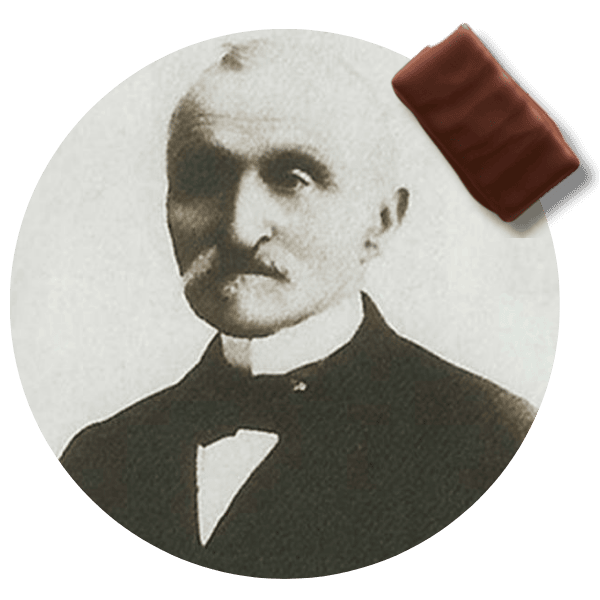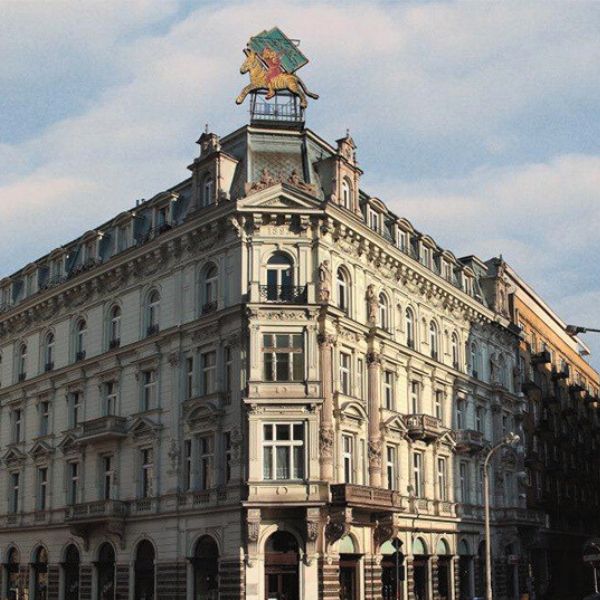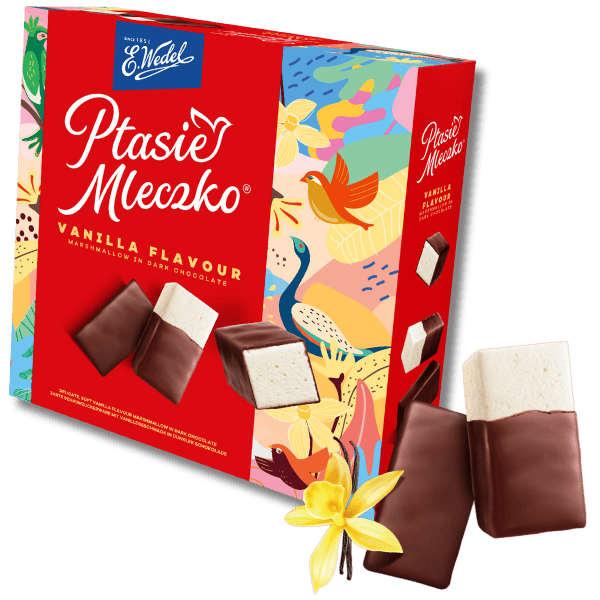Chocolate and culture – E.Wedel’s role in Polish heritage
Chocolate is more than just a sweet treat. In Poland, it is a symbol of comfort, tradition, and everyday pleasure. Few brands illustrate this bond between chocolate and national culture as strongly as E.Wedel, the iconic Polish chocolatier whose story stretches over 170 years.

For generations, E.Wedel has been more than just a confectionery producer – it has been a part of Polish identity, family memories, and cultural continuity. This article explores the deep connection between chocolate and culture, and how E.Wedel has shaped and reflected Polish heritage throughout history.
The origins of E.Wedel - a taste of European elegance in Warsaw
 The story of E.Wedel begins in 1851, when Karol Wedel, a German-born confectioner, opened a small chocolate shop and factory in Warsaw. His vision was to bring the refined flavors of European chocolate to Polish customers – but tailored to local tastes. Wedel’s dedication to quality, craftsmanship, and innovation quickly earned him recognition.
The story of E.Wedel begins in 1851, when Karol Wedel, a German-born confectioner, opened a small chocolate shop and factory in Warsaw. His vision was to bring the refined flavors of European chocolate to Polish customers – but tailored to local tastes. Wedel’s dedication to quality, craftsmanship, and innovation quickly earned him recognition.
Karol’s son, Emil Wedel, took over the company and expanded it with modern equipment, pioneering new chocolate-making techniques in Poland. Under Emil’s leadership, the company introduced its now-famous signature – a handwritten “E. Wedel” – that to this day remains a mark of authenticity and tradition.

From the very beginning, Wedel stood for excellence. But more importantly, it stood for trust. In the late 19th and early 20th centuries, E.Wedel became synonymous with celebration – wedding gifts, name-day boxes, and holiday traditions. Wedel’s products were more than just sweets – they became cultural symbols of joy and care.
Chocolate through adversity - E.Wedel and the Polish spirit
Throughout Poland’s turbulent 20th century history – wars, uprisings, and political transformations – E.Wedel remained a constant, earning the affectionate nickname: “the chocolate of generations.”

During the interwar period, the company flourished, introducing products that would become classics: Torcik Wedlowski, Ptasie Mleczko®, and elegantly packaged chocolate bars. The factory in Warsaw’s Praga district, opened in 1930, was not only a production site but also a beacon of modern Polish industry.
World War II and the post-war communist era brought immense challenges. Yet, despite nationalization and economic struggles, the brand survived – and even thrived. For many Poles, E.Wedel chocolate was a symbol of resilience. A rare treat, often saved for special occasions, it carried emotional weight, evoking comfort, hope, and nostalgia.
The famous Wedel neon sign near Warsaw’s Praga factory, showing a boy on a zebra sipping hot chocolate, became a beloved part of Warsaw’s cityscape – a visual reminder that sweetness and beauty could still exist in difficult times.
E.Wedel as a cultural icon
Today, E.Wedel is recognized not only as a key market player in Poland but as a cultural icon.
-
Ptasie Mleczko®, introduced in 1936, remains one of the most beloved Polish confections. Generations have grown up associating it with childhood, family visits, and holidays. The soft, creamy foam covered in delicate chocolate is unique to the Polish market – and uniquely tied to E.Wedel.
-
Torcik Wedlowski is not just a wafer cake. It is a symbol of refinement and tradition, served at birthdays, anniversaries, and festive dinners. With its handmade decorations, it bridges everyday indulgence with artistic craftsmanship.
-
E.Wedel chocolate bars, in their classic blue packaging, are part of Polish culinary memory – often the first chocolate many children taste, and a gift brought abroad by travelers wanting to share a piece of home.

E.Wedel’s impact goes beyond products. It supports local artists, collaborates with young chocolatiers, and operates flagship cafés in Warsaw, called Pijalnie Czekolady, which has become a meeting point for tourists and locals alike. The café blends history and modernity, with vintage aesthetics and innovative desserts.
Chocolate and Polish traditions
In Poland, chocolate plays a special role in holidays and family customs:
-
During Christmas and Easter, E.Wedel products are often included in festive baskets and gift boxes.
-
For Mother’s Day, Women’s Day, or Valentine’s Day, E.Wedel pralines and chocolate hearts have become a popular way to express affection.
-
In schools and workplaces, chocolate is a go-to treat for name days and celebrations.
The role of chocolate in Polish culture is one of emotional connection – it’s not only about flavor, but the act of giving, sharing, and cherishing moments.
E.Wedel in the modern era - balancing heritage and innovation

As E.Wedel continues to grow – expanding to international markets, introducing new product lines, and experimenting with trends – it stays rooted in its heritage. Every innovation reflects an understanding of what the brand represents to Poles: trust, tradition, and taste.
Recent innovations like limited-edition Ptasie Mleczko® flavors, Creamy chocolate collections, and cross-category collaborations with Polish companies show that E.Wedel is not afraid to evolve. Yet, it does so with respect to the past – always keeping the original E.Wedel values at heart.
In recent years, E.Wedel has successfully experimented with new ways of enjoying its classic products, responding to the evolving needs and expectations of today’s consumers. One standout example is Ptasie Mleczko® in the form of a shake – a light, creamy drink that allows fans to savor their favorite flavor in a modern format. Ptasie Mleczko®-inspired ice creams have also become a summer sensation, combining the familiar, beloved taste with a refreshing twist that’s perfect for warm days.

What’s more, these new ways of enjoying iconic products – from Ptasie Mleczko® shakes to ice cream – are actively promoted by social media influencers, who present them in an engaging and visually appealing way. This approach allows E.Wedel to connect with younger consumers and strengthen its image as a heritage brand that embraces innovation and modern consumption trends.
These innovations not only attract younger generations but also breathe new life into iconic products – proving that even the most traditional treats can be rediscovered in exciting, contemporary ways. In doing so, E.Wedel masterfully bridges the past with the future, honoring its heritage while continuously inspiring new ways to enjoy it.
Moreover, E.Wedel invests in sustainability, ethical sourcing of cocoa, and community involvement – ensuring that its cultural legacy is matched by responsibility.
A symbol of Polish sweetness worldwide
As Poland becomes increasingly globalized, E.Wedel serves as an ambassador of Polish taste and tradition abroad. For the Polish diaspora, bringing a box of Ptasie Mleczko® or a Wedel chocolate bar is more than a gift – it’s a piece of home. For international consumers discovering the brand, E.Wedel represents an authentic European chocolate with a rich story.
Participation in international fairs like ISM, Thaifex Anuga, APAS Show, and SIAL Paris demonstrates that Wedel is not just preserving tradition – it is also creating new chapters of its cultural journey.
More than chocolate
E.Wedel is not merely a brand. It is a cultural institution in Poland – as intrinsic to Polish heritage as pierogi, Chopin, or folk embroidery. From childhood memories to celebratory moments, from simple pleasures to national pride, E.Wedel has woven itself into the fabric of Polish life.
Its journey is a testament to the power of chocolate – not just to delight the palate, but to comfort the soul, to preserve history, and to create shared cultural meaning. As long as there are stories to be told and memories to be made, E.Wedel will remain a beloved chapter in the book of Polish heritage.
